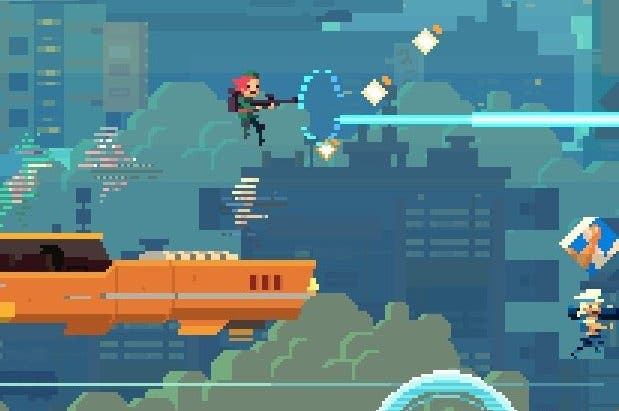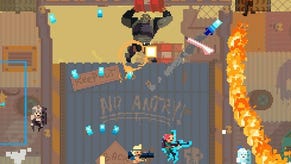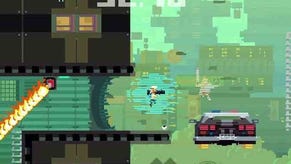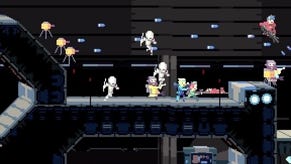Super Time Force review
A sound of thunder.
In the confusing economy of video games, a bullet is often a unit of time. That's definitely the case with Capybara's latest, where a taut 60-second countdown presides over levels that initially seem too large to fit into such strictures. Cast as a motley of clods zipping forwards and backwards through human history, you have a secret weapon on your side, however. You can lead one death-dealing trooper into battle, and then pause the conflict, rewinding the clock and allowing you to lead another death-dealing trooper into battle alongside the first.
Time and space mesh in spectacular ways as you raise an army of tooled-up ghosts who can chew through whatever crosses their path - a lawnmower of death, pieced together one glittering blade after another. Four assault rifles means four times the bullets and four times the speed when it comes to laying on damage; as your headcount and their bodycount rise in tandem, that 60-second timer becomes pliable enough to fit all manner of carnage into it. Super Time Force is a massively single-player game, in other words. It's the last 30 minutes of Bill & Ted's Bogus Journey folded in on itself and then set ablaze.
This is a seriously elegant design, but it's mercifully never allowed to feel like that. Instead, each scrolling level is an elbowy 2D pile-up as you fight invading robots and tackle a wide range of pleasantly moronic counterfactual objectives. The cut-scenes are indulgently long and the meme-savvy script often feels simultaneously flat and overworked, but it matters little when there's so much imagination (and discipline) on display where it belongs - in the mechanics.
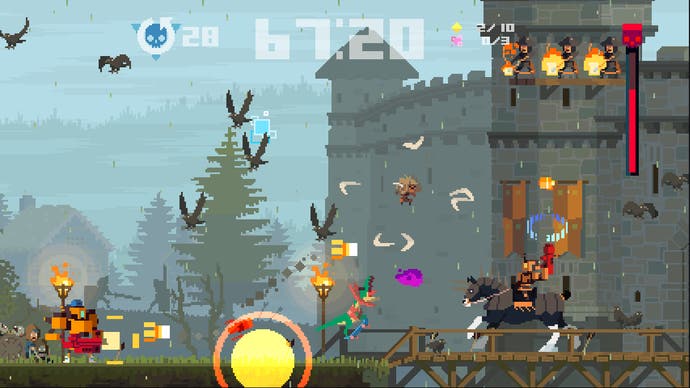
Each member of the team has their own weapon that comes with a secondary fire mode and as you fill the ranks, you'll learn how best to use these various bits and pieces together. The assault rifle trooper's main attack is feeble, for example, but when charged it can spray a wide cone of death in front of him. Imagine if there were eight of those all spraying at once. Elsewhere, the skateboarding dinosaur (I warned you about the script) can swap out a snap-jawed melee for a bright spray of toxic crud, and the dolphin can... well, I'm still not entirely sure what that guy's good for.
You'll double-up and combine combatants in a manner that ultimately has more in common with music production than modern warfare
Going into battle with the standard handful of lives is clearly too simplistic for a game with such super-positioned preoccupations. Instead, Super Time Force chucks you through each of its levels with 30 time-outs. These can be triggered at any moment, allowing you to scroll back through the action and then throw another soldier into the mix at a point of your choosing so they can fight alongside the recordings of their colleagues. Recordings feels apt, too. You'll double-up and combine combatants in a manner that ultimately has more in common with music production than modern warfare. Bringing in extra fire power to help your previous selves is kind of like rewinding the tape and laying down another instrument that plays alongside the first.
How you build your mixes is a collaboration between you and the game's relentless pacing. An armoured door might need three shotgun ladies to chew into it at once to beat the clock, while an ambush may require a real division of labour, with the shield-bearer protecting snipers whose charged shot can pass through scenery. Levels tend to be linear, but some will still require you to split off and prioritise different objectives simultaneously. (In a game as head-spinning as this, simultaneously actually sort of means one after the other, mind.) Decisions! How many troops should you dispatch to snag time-extends or the hidden golden shards which give you another precious time-out? How many seconds can you waste collecting new members of the team or clearing the path ahead?
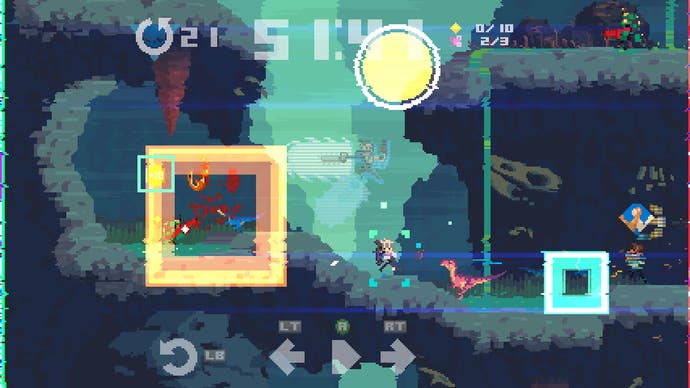
The more you start to make sense of it all, the more these deeper considerations bring a truly tactical edge to what initially looks like chaos. You trigger a time-out automatically when you die, for example, but if you manage to subsequently save one your fallen team-mates by blasting what would have killed them before it's reached its target, you can then collect your frozen ally as a weapon power-up - and that might actually be worth a little temporary sacrifice. Elsewhere, bubbling rifts in space-time allow you to slow down foes when things get too hectic; hitting one at the right moment can change the entire flow of a battle. Even escort-this or defend-that missions are OK here, because they revolve around how you apply your firepower over a complex series of choices. There's real scope for player expression.
It's exhausting, but when it all clicks it's amazing, too. The first time you realise that three seconds isn't enough time to beat a boss by yourself, but it may be enough if there are 15 of you working in unison, this 2D shooter starts to reveal glimpses of the pan-dimensional thinking that brought it all about.
Ultimately, though, Capybara is too smart to let the whole thing devolve into a puzzle game. There's a ragged and almost drunken vibrancy to proceedings that belies the fact that Super Time Force secretly has the soul of a Texas Instruments scientific calculator. Treasure's back catalogue is invoked heavily throughout, with huge screen-filling bosses whittled down by nimble skewer-legged heroes across a backdrop of sunsets and temples lit by gorgeously warm colour schemes - and while the game doesn't borrow the delirious mix-and-match weapon system from Gunstar Heroes, it does use the same 360-degree aiming.
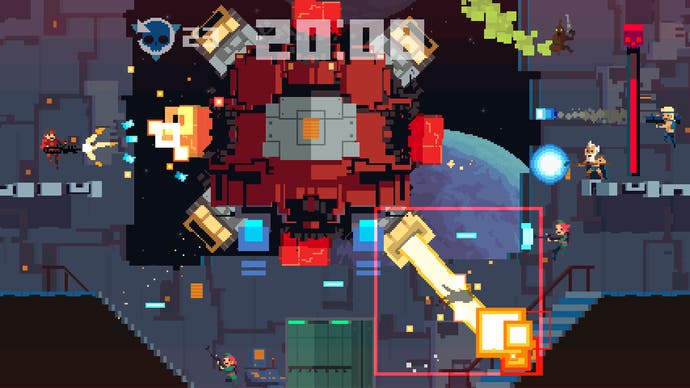
It also strings its set-pieces through gloriously unlikely places. You'll hop from one car to the next in a futuristic traffic jam before defending a SWAT truck from oncoming aggressors. You'll hunker down in a patchwork post-apocalyptic coliseum to battle a monstrous lizard who wields a Coke machine as a shield. The intricate geometrical pixel-art weaves wonders with ruined cityscapes and sodden insect-riddled jungles, while the visual creativity that powers everything manages to put new spins on old ideas and offer up entirely new treats.
Atlantis is reimagined as Atlantic City, complete with seedy concessions and crumbling water parks, while one particularly memorable boss is fought over a variety of late 1990s personal website HTML crimes. Dinosaurs spiral broken-backed from your bullets and cyber-cops are blasted naked from their sleek uniforms. Minutes later, you're jet-packing around heaven with your army of ghosts, shotgunning angels to pieces. Time travel, it transpires, is a thing of bewildering intensity, and like the old chestnut has it, as soon as you get directly involved, the whole thing bucks and reacts and the predictability vanishes.
It all comes together in end-of-level replays that edit the manic stop-start ad-libbing of each mission into a single, continuous take. A lone soldier fans out into a mob, Gunstar transitions to Katamari, and it slowly becomes apparent that Capybara actually has something to say about the way that video games experience time. About how they slice it up, jump around inside it, and then put it back together again as they draw order from antic disorder and a evolve a clean racing line over the least promising of terrain. About how, regardless of the mediations and interruptions of a particular playthrough, video game time still manages to flow seamlessly through the mind of the player.
Video games were not the first time machines, then, but they're definitely the most capable, and it's that very capability that's so dazzling here. All art transports you, but only video games allow you to pause, rewind, ponder - and poke your finger into the mechanism. Only video games let you glimpse the past or the future and then get involved.
